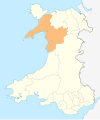|
Morfa Mawddach railway station
Morfa Mawddach railway station (formerly Barmouth Junction) is an unstaffed station located on the outskirts of the village of Arthog in Gwynedd, Wales, on the Cambrian Coast line between Machynlleth and Pwllheli. Built by the Aberystwith and Welsh Coast Railway in 1865, it was formerly the junction station for the Ruabon to Barmouth Line. Since the closure of the Ruabon to Barmouth line in 1965, it remains open, as a minor station on the Cambrian Line. History The station was built by the Aberystwith [sic] and Welsh Coast Railway and opened on 3 July 1865 as Barmouth Junction.[1][2] From 1899 to 1903 there was a connection with the Barmouth Junction and Arthog Tramway. The station was host to a GWR camp coach from 1934 to 1939.[3][4] A camping coach was also positioned here by the Western Region from 1956 to 1962. In 1963 the administration of camping coaches at the station was taken over by the London Midland, there were three coaches here in 1963 and 1964 and two from 1965 to 1968.[5] Until the 1960s there was a summer service between London Paddington and Pwllheli, via Birmingham Snow Hill, Shrewsbury and Machynlleth. On 13 June 1960 it was renamed Morfa Mawddach.[2] BackgroundNorth of Morfa Mawddach the railway crosses the Afon Mawddach on the Barmouth Bridge. Morfa Mawddach is mainly used by passengers travelling to Barmouth from south of the Mawddach Estuary: parking at the station and taking the train to Barmouth is often much quicker than the 20-mile road journey via Dolgellau. Originally a four-platform station, it is now a single platform unstaffed halt. Trains stop on request. Morfa Mawddach is often quoted as an example of a notable feature of the Great Western Railway in Wales, namely its inheritance of junctions in unlikely and inconvenient locations. Other examples are Moat Lane Junction, Talyllyn Junction, Afon Wen and Dovey Junction.[6] The trackbed to Dolgellau now forms the Mawddach Trail (Welsh: Llwybr Mawddach), which officially starts at the station car park. FacilitiesThe station has very few facilities. There is a payphone on the platform, but there are no toilets or help points available. There is a small waiting shelter and a car park with 20 spaces.[7] Services
ReferencesNotes
Sources
Further reading
External linksWikimedia Commons has media related to Morfa Mawddach railway station.
|
|||||||||||||||||||||||||||||||||||||||||||||||||||||||||||||||||||||||||||||||

